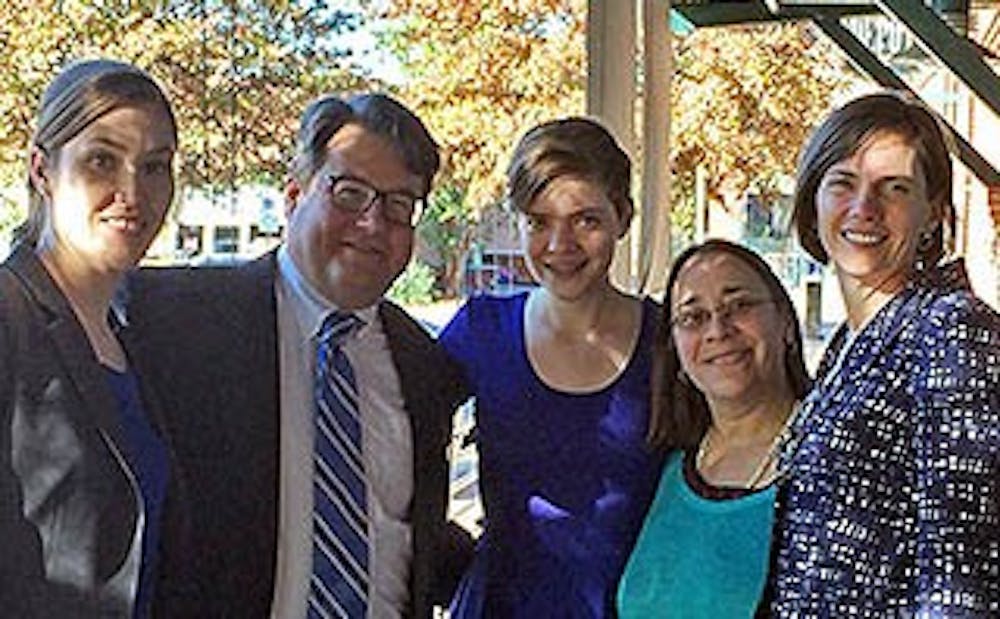After a setback in a high-profile environmental court case last year, the Duke Environmental Law and Policy Clinic is again putting pressure on the North Carolina government to regulate carbon emissions.
The clinic and Our Children's Trust—an Oregon non-profit that works with youth to push for climate recovery policies—are supporting a petition to limit carbon emissions, which was started by teenage activist Hallie Turner. It was rejected by the North Carolina Environmental Management Commission in 2014, and a county court appeal was denied in 2015. But with the leadership of Clinic Director Ryke Longest and Michelle Nowlin, senior lecturing fellow at the clinic, graduate students are working to incorporate new scientific data and legal arguments into the petition.
“The science showing adverse impact and costs [of climate change] have increased so much over time,” Longest said. “We’re rebuilding the case from bottom-up, with better science and better law.”
The situation today
In 2014, Turner, then 12 years old, petitioned the EMC to set a rule that would reduce carbon dioxide emissions by four percent annually. The clinic came to Turner's assistance after the EMC denied the petition, but a November 2015 appeal in the Wake County Superior Court was also denied.
“There is a lot of hypocrisy in North Carolina’s position,” said Longest, describing the government’s approach to environmental regulation as a Catch-22.
In rejecting the petition, the North Carolina government argued that state laws prohibit enacting rules that are more stringent than federal rules on the same subject. At the same time, North Carolina is suing the Environmental Protection Agency to stop it from making more stringent federal rules, on the grounds that this violates state supremacy.
By this logic, neither state nor federal government is authorized to make the first move to regulate carbon emissions. The clinic’s view is that the gridlock is due to the EMC chairman cherry-picking which statutes to apply.
Shannon Arata, Law School ’13, who focuses on litigation at the clinic, believes that this inconsistency will be cleared up eventually but admits that lengthy proceedings are typical.
“It is very difficult to get enforcement actions undertaken,” Arata said. “There is a big lag time, and then we also face this hurdle of getting necessary new regulations into place.”
But Longest said he remains optimistic that, with an updated petition, the EMC will have to grant a fair hearing and may reach a different conclusion.
The two-year interval since the initial petition has made the case more favorable, he noted. For example, solar panels have become cheaper and more efficient.
“I have no doubt [the petition] has a realistic chance of success over some timeline,” he said. “As the costs come down, the excuses have to give way."
Future court strategy
Both Turner and Our Children's Trust are now official clients of the clinic, which strengthens the case and future actions. North Carolina is considered a state where environmental litigation is relatively difficult.
“It's critical to have partners in each jurisdiction to support the cases, and we are thrilled to be partnered with the Clinic,” wrote Nathan Bellinger, staff attorney for Our Children's Trust, in an email.
Turner's petition and the clinic's court strategy both rely on a doctrine known as "public trust," which states that the government has authority over certain natural resources that cannot be privatized. Although this doctrine is traditionally applied to protect water resources, legal experts are exploring the possibility of extending its protection to the atmosphere.
If the notion of "atmospheric trust" gains approval in court, it will have wide-reaching ramifications. In effect, it allows courts to compel government action on protecting the atmosphere, which affects industries and businesses across the entire state. Members of the Clinic said they are convinced that this is the right way to go.
“Atmospheric trust will be viewed in history’s hindsight as not having been an overreach, but rather, a recognition that, just like the public trust protects water, air is every bit as important,” Longest said.
Beyond the petition
But the clinic is looking beyond the petition to other environmental law issues as well.
As it approaches its tenth year, the clinic continues to provide policy development and litigation services to community clients through about a dozen graduate students from the Law School and the Nicholas School of the Environment per semester.
Currently students can choose from 10 cases that are on the docket, on a variety of subjects such as food and agriculture, energy systems and marine ecology. The Environmental Law and Policy Clinic is one of 11 legal clinics at Duke.
Although the clinic primarily focuses on graduate students, Longest pointed to increased outreach to the wider student population by social media and cooperations with student-led campus initiatives.
Sophomore Claire Wang, president of the Duke Climate Coalition, noted that the clinic’s litigation work complements activist projects on campus to form a multi-pronged approach. Longest recently took on the role of campus faculty advisor for DCC, and plans for the clinic to reach out to undergraduates through Bass Connections and events on climate change.
Get The Chronicle straight to your inbox
Signup for our weekly newsletter. Cancel at any time.

